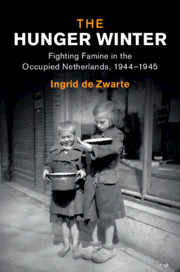Crossref Citations
This Book has been
cited by the following publications. This list is generated based on data provided by Crossref.
Lumey, L. H.
Ekamper, Peter
Bijwaard, Govert
Conti, Gabriella
and
van Poppel, Frans
2021.
Overweight and obesity at age 19 after pre-natal famine exposure.
International Journal of Obesity,
Vol. 45,
Issue. 8,
p.
1668.
Corporaal, Marguérite
and
de Zwarte, Ingrid
2022.
Heritages of hunger: European famine legacies in current academic debates.
International Journal of Heritage Studies,
Vol. 28,
Issue. 1,
p.
30.
Gyimah, Justice
Saalidong, Benjamin M.
Nibonmua, Louis K. M.
and
Otekunrin, Olutosin Ademola
2023.
The battle to achieve Sustainable Development Goal Two: The role of environmental sustainability and government institutions.
PLOS ONE,
Vol. 18,
Issue. 9,
p.
e0291310.
Ó Gráda, Cormac
Li, Chihua
and
Lumey, L. H.
2023.
How much schizophrenia do famines cause?.
Schizophrenia,
Vol. 9,
Issue. 1,
C. Williams, Adrian
Badenoch, Ellena
and
J. Hill, Lisa
2024.
Bridging Social Inequality Gaps - Concepts, Theories, Methods, and Tools.
Vol. 21,
Issue. ,
Cheng, Mengling
Conley, Dalton
Kuipers, Tom
Li, Chihua
Ryan, Calen P.
Taeubert, M. Jazmin
Wang, Shuang
Wang, Tian
Zhou, Jiayi
Schmitz, Lauren L.
Tobi, Elmar W.
Heijmans, Bastiaan T.
Lumey, L. H.
and
Belsky, Daniel W.
2024.
Accelerated biological aging six decades after prenatal famine exposure.
Proceedings of the National Academy of Sciences,
Vol. 121,
Issue. 24,
de Zwarte, Ingrid
and
Janssen, Lindsay
2024.
Recalling the Hunger Winter: Evoking famine memory beyond the national.
Memory Studies,
Vol. 17,
Issue. 2,
p.
213.
Blouin, Simon
Herwix, Alexander
Rivers, Morgan
Tieman, Ross J.
and
Denkenberger, David C.
2024.
Assessing the Impact of Catastrophic Electricity Loss on the Food Supply Chain.
International Journal of Disaster Risk Science,
Vol. 15,
Issue. 4,
p.
481.
de Zwarte, Ingrid J. J.
Ekamper, Peter
and
Lumey, L. H.
2024.
Infant and child mortality in the Netherlands 1935–47 and changes related to the Dutch famine of 1944–45: A population-based analysis.
Population Studies,
Vol. 78,
Issue. 3,
p.
483.
Mwambari, David
2024.
Vernacular memories: recalling Rwanda’s 1943–44 famine during the Covid-19 hunger crisis.
Third World Quarterly,
Vol. 45,
Issue. 2,
p.
294.
van Oort, P. A. J.
Fonteijn, H. M. J.
Hengeveld, G. M.
and
Petersen, Alexander
2024.
DARTS: Modelling effects of shocks on global, regional, urban and rural food security.
PLOS Complex Systems,
Vol. 1,
Issue. 2,
p.
e0000006.
Sambuco, Patrizia
2024.
Introduction.
Journal of Romance Studies,
Vol. 24,
Issue. 3,
p.
241.
Pendle, Naomi
and
Akoi, Abraham Diing
2025.
Music and the politics of famine: everyday discourses and shame for suffering.
Disasters,
Vol. 49,
Issue. 1,
Jensen, Lotte
2025.
Remembered and Forgotten: The Nineteenth-Century Flemish and Dutch Famine in Cultural Memory.
Dutch Crossing,
Vol. 49,
Issue. 1,
p.
1.



